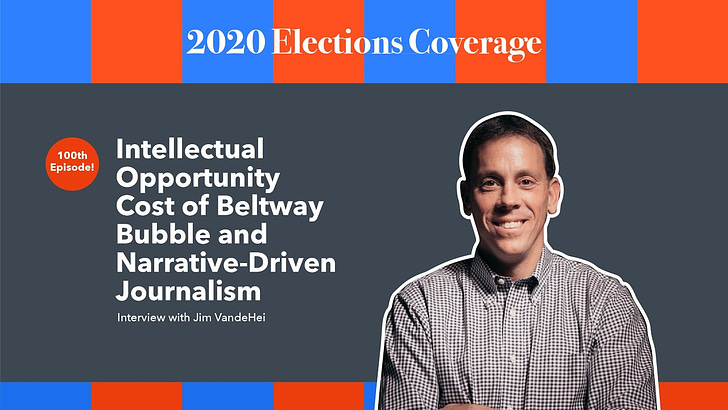100th episode of Policy Punchline! – with Axios CEO Jim VandeHei...
This article was originally published on 11/30/2020 for my informal email list. I’m re-posting some of my earlier newsletters here as a gradual process to shift to Substack.
Today we’re publishing our 100th episode of Policy Punchline.
I didn’t expect it’d come this quickly, but yes we’ve done it. Since the first episode dropped on Jan. 9th, 2019, we’ve survived 691 days and updated with an amazing consistency and an ever-growing passion.
Our team has grown to over 50 student researchers, co-hosts, designers, and affiliated contributors; we’ve together published two books; we’re developing unique expertise in economics, politics, energy, tech & media, finance, humanities and beyond; we’ve established ourselves as one of the most prolific and well-run student podcasts in America… Most importantly, we are more focused than ever on our mission of “promoting long-form dialogues on frontier ideas and urgent issues” with our brilliant guests. I am deeply grateful for all of you being on this journey with me.
We started podcasting before it became the buzzword, counter-mainstream media form. Long before I truly realized the significance of it, something quite extraordinary happened in the past two years. Podcasting has presented a powerful alternative to the fractured media landscape, a solution to the polarization of social discourse, and a reorientation back to subtleties necessary for any consensus-building.
Sure, famous TV anchors have their own podcasts to share personal insights, and newspapers use podcasts to report daily news, but they merely present a supplement and alternative format to flush out the existing content produced by legacy media outlets.
The real revolution, on the other hand, has been led by personalities like Joe Rogan, Sam Harris, Eric Weinstein, Lex Fridman, Robert Harrison – whom you cannot really define with traditional frameworks, and who say things that you otherwise would never hear and patiently reason through in the public forums.
I thus see ourselves being on a bigger mission – to break through the bickering of ideologies and stagnation of political imagination; to truly enrich the intellectual scenes around our friends and families; to challenge the shielded, institutionalized narratives that would otherwise dominate our discourse… We're not the audio version of The Daily Princetonian or some campus magazine. There's gotta be something bigger we strive for.
This is a very great start to a long journey ahead.
On to our 100th episode
Who else to better capstone our journey thus far than Jim VandeHei? He is the co-founder of Axios and Politico, two of the very few successful media companies founded over the last two decades. Jim is quite thoughtful and carefree; he’s not afraid of using curse words and going on rants about the problems of NYTimes and the beltway media…
We talked about a lot of poignant issues:
Is there anything wrong with traditional mainstream media outlets like New York Times, CNN, Fox News, and the like? Is it fair to criticize them as narrative-driven journalism that hides behind the veil of neutrality and rationality, while in fact seeking to push for a certain set of narratives with cherry-picked facts and pandering to their base? Are any of these criticisms fair?
What can the beltway media outlets learn from the 2020 elections, when there was no “Blue Wave” as widely reported before the election?
Did we waste four years of precious time over-analyzing Trump when there was a plethora of more urgent issues left undiscussed – incurring a huge intellectual opportunity cost to our socio-political discourse?
On the day before our interview, BuzzFeed announced its acquisition of Huffington Post in an all-stock deal. Is it a merger out of necessity? How hard has it been for independent media platforms even before Covid-19 hit? We saw Ezra Klein and Matt Yglesias leaving Vox amongst a series of high-profile departures in the media world – what is going on?
While there is now more high-quality information available than ever before, it has also become easier to spread and consume misinformation and misrepresenting “facts.” Who caused the media slant? The consumer or the supplier? How can consumers realistically make better decisions in their daily media consumption?
And many more...
As always, you may find the interview on YouTube, iTunes, Spotify, SoundCloud, Stitcher, Google Podcasts, and a range of other podcasting platforms you may prefer.
I think you'll like Jim's analysis and critique. This is one of the most insightful conversations we’ve had on the media landscape and political discourse – we hope it is a meaningful representation of how far we’ve come for our 100th episode!



